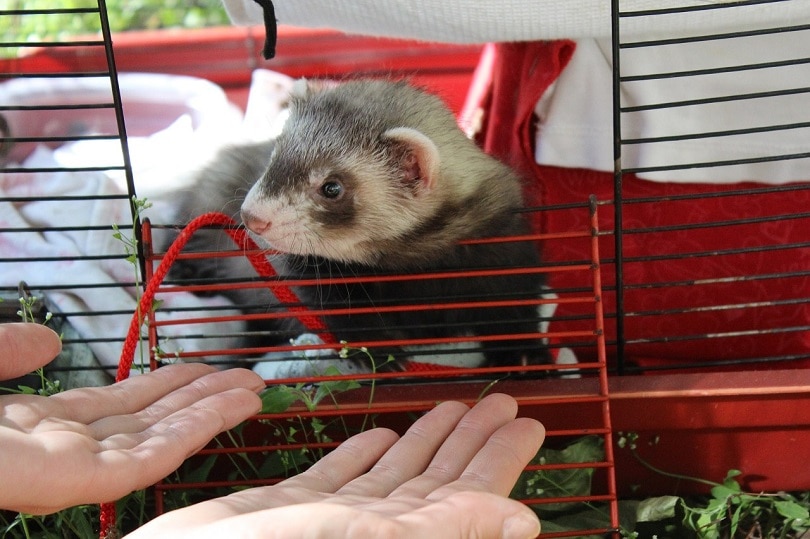
Ferrets are popular pets in America and around the world. This critter is easy to take care of, has a reasonably long lifespan, doesn’t cost much to keep alive, and is quite entertaining to watch. However, if you have never owned a ferret before, you probably have many questions, like where to get one, how much it costs, and what type of home it requires. We assembled a short guide to help answer these questions and more, so you can see if these animals are right for you and your home.
Ferret Facts

Do Ferrets Make Good Pets?
Ferrets make great pets, as evidenced by their extreme popularity. They’re the most popular animals besides cats and dogs, and there is a good chance that you’ve known someone with a ferret in your lifetime. It’s a cuddly animal that doesn’t mind if you carry it around and pet it. It’s clever and curious and loves to explore whenever it gets a chance. It’s master at getting out of its cage and getting around all sorts of barriers, so you will need to take extra care ferret-proofing your home. Unlike cats and dogs, these pets won’t come when you call them, so you need to be careful they don’t get away, or they can get lost.
Ferrets are typically most active at dusk and dawn when light levels are low, but they will also be active at other times of the day. It will require some time out of the cage every day to stimulate its mind and get the exercise it needs, but this is a great time to play and bond with your pet.
Where Can I Get a Ferret?
Due to their extreme popularity, you can find a ferret in most pet stores. In most cases, if they don’t have a ferret in stock, you can order one that will arrive in a few days. However, unless you live in a rural area with a limited population, there are likely several pet stores you can visit in a single day, and there’s a very good chance you will be coming home with a new pet ferret.

How Much Does It Cost to Own a Ferret?
In total, your initial cost will likely be at least $400, with another $100–$300 spent yearly.
What Kind of Home Does My Ferret Need?
Most ferrets will live in a large cage. Inside, you will want to keep a litter pan and train your pet to use it so the cage will be easier to clean. Ferrets prefer to use the cage corner as a bathroom, and most litter pans will accommodate this setup. You will also need a food bowl and a water bottle along with a bed or a hammock where your pet can sleep. Most ferret cages will also have ramps and platforms that your pets can use to explore their environment. Even though ferrets sleep most of the day, they like to get plenty of exercise while awake and will appreciate the ramps if you are busy. Your pet needs plenty of space, so expect your cage to be around 50 inches tall.

What Should I Feed My Ferret?
Ferrets are carnivores, so they need a diet high in animal protein. These animals also need plenty of fat and very little fiber so they will not be chewing hay like a rodent. They eat frequently, so you will need to keep food available so they can feed every 3 to 4 hours. Ferrets tend to eat only what they need, so you likely don’t need to worry about them becoming obese. A dry commercial ferret food is the best choice because you can keep it available without worrying about spoilage.
A constant supply of water must also be available at all times so your pet can stay hydrated. Change the water frequently to keep it fresh, as many bottles change the flavor, which might discourage your pet from using it.
How Do I Take Care of My Ferret?
Feeding
Keep food available around the clock so your pet can eat at its leisure. You will also need to keep a constant supply of fresh, clean water.
Socialization
Ferrets are extremely friendly and love to spend time outside their cage. Your pet will be excited to meet all of your friends, and it will let you carry it around and pet it.
- Related Read: Do Ferrets Like to Cuddle?

- You May Also Like: Chocolate Ferret: Facts, Varieties, Rarity & More (With Pictures)
Exercise
Most experts recommend setting aside at least 1 hour per day to let your ferret roam around your house to get the exercise that it needs to stay healthy and happy. Ramps and platforms in the cage will also help your pets stay active when they can’t get out.
- See Also: Can Ferrets Swim? & Do They Like It?
Toilet Training
It’s possible to train your ferret to use the litter box. The training is simple and only requires you to put the box in the corner of the cage, fill it with litter, and place a small amount of used litter inside so the ferret recognizes it as a bathroom. This trick will save you countless hours of cleaning.
- Related Read: How Intelligent Are Ferrets?
Temperature
Ferrets can easily suffer from heatstroke in temperatures above 85 degrees Fahrenheit. Since this temperature is possible in many parts of the United States, most experts recommend having a plan in place to keep them cool. Usually, an air conditioner is all that is required to keep the temperature manageable.

How Do I Know If My Ferret Is Sick?
Diarrhea
Diarrhea is one of the most common illnesses your pet is likely to face. It’s a sign of a gastrointestinal problem that results in loose feces that are usually green and slimy. Several strains of bacteria can cause diarrhea, with some being worse than others, but the condition usually clears up in a day or two. If not, call your vet to have your pet looked over.
Intestinal Foreign Bodies
Another problem common to ferrets is intestinal foreign bodies. Ferrets love to chew things and eat nearly anything they can fit in their mouth, including plastic, rubber, and foam. These objects can block their digestive system, causing a life-threatening situation.
Cancer
Unfortunately, ferrets often develop cancer early in life and will require yearly examinations from a vet so you can catch it early if it affects your pet. Every ferret over 3 will need yearly bloodwork and X-rays to stay healthy.
Final Thoughts
Ferrets make wonderful pets and they aren’t hard to raise. The initial cost of the large cage can put off some people, but it’s a one-time purchase that will also be suitable for any other ferrets you might get in the future. Yearly upkeep is not that expensive, and routine maintenance is not as difficult as it is for other cage animals. Ferrets can use a litter box, and they don’t require a constant supply of timothy hay.
Featured Image Credit: Daniel Steinke, Pixabay









